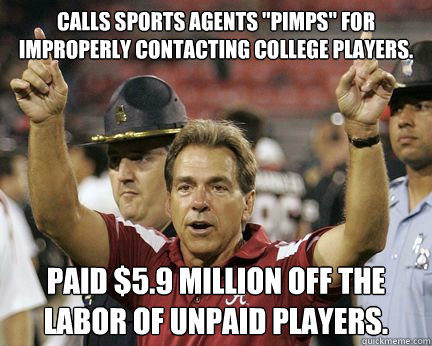AS MICHIGAN STATE'S COACH IN THE '90S, NICK SABAN WAS NOT WELL LIKED, BUT HE WAS SEEN AS BRILLIANT FOOTBALL MIND
Sixteen years and one month ago, St. Nick disappeared. Nick Saban had always been an odd kind of savior at Michigan State—reserved, even distant—but he had a reputation, even in 1999, as a brilliant football mind. For most of Michigan State's rabid and frustrated fan base, that was enough.
In his fifth year in East Lansing, Saban justified the faith in him, leading the Spartans to a 9–2 record, their best in 33 years.
And then he left for an LSU program that had just gone 3–8.
Michigan State fans were riled up, of course. Most fan bases would be. Within the program, though, there was a different kind of anger. In a team meeting shortly before he decided to leave, Saban left many players with the impression he would stay at Michigan State. He never really did say goodbye.
But then, it's weird to say goodbye when you never seemed that interested in saying hello. Saban had never been as popular in the school's football offices as he was with fans. Even now, people who liked him at Michigan State feel compelled to explain themselves.
Former Michigan State assistant Bob Casullo: "I'm probably unusual in that I'm a Nick Saban fan."
Former Spartans receiver Muhsin Muhammad: "I'm probably in the minority too: I had a good relationship with Nick."
What was the problem? Well, you hear a lot of stories about football coaches with bad tempers. The difference with Saban, summed up by former receiver Gari Scott: "He always looked like he was mad."
Former Spartans center Jason Strayhorn says, "There is no softer side to Nick. He is all business."
There is an old coaching maxim about knowing when to kick their butts and knowing when to pat their backs. Saban followed half of it. Sometimes Saban would excoriate his assistant coaches in front of the players so viciously, the players became uncomfortable.
"We would all say, 'He can't be like this at home,'" Scott says.
In film sessions, he would talk until he found a reason to be angry. Then his voice would rise. And then he would take it out on the team in practice.
Strayhorn remembers one film session when Saban erupted over a missed assignment by a player named Anthony Pleasant, which was interesting because Pleasant did not even play for Michigan State. He had played for the Cleveland Browns when Saban was their defensive coordinator. Yet somehow, Saban would make Michigan State's players pay for a mistake Anthony Pleasant had made in the NFL. To this day, Strayhorn says of Pleasant with a laugh, "I hate that guy."
When Saban left for LSU at age 49, he famously sent a plane back to Michigan to pick up any assistants who wanted to join him. Nobody got on it. They stayed in East Lansing to work under his former assistant, Bobby Williams. For many observers, there was an easy and obvious conclusion: They never wanted to work for the guy again.
And a lot of players surely thought:
Good riddance.
But time passed. And every now and then, two of his former Spartan players would be chatting, and one would admit:
"I'm rooting for LSU."
And the other would say: "Me, too."
And then one of them would say: "Don't tell anybody."
We all know now what Saban did after he left East Lansing. He became one of the most successful coaches in any sport. On Dec. 31, he will lead Alabama into a College Football Playoff semifinal against Michigan State, with his eyes on a fifth national title.
But in 1999, that story had not been written. Many people in the media wondered if Saban was worth the $1.2 million annual salary he got from LSU. (Compared to current coaching salaries, that looks like the minimum wage, but it was enormous at the time.) You could reasonably argue that Saban had cashed in on one great year.
So, why did some of his Michigan State players quietly pull for Saban's LSU team? Well, it was not out of affection for Saban. Affection was never an integral part of Saban's program. Sometimes it seemed like affection might just get in Saban's way.
In East Lansing, Saban would often quote one of his favorite books, the M. Scott Peck bestseller,
The Road Less Traveled.
The first section of the book is called "Discipline". The first part of "Discipline" is called "Problems and Pain." The first line of "Problems and Pain" is …
Life is difficult.
Before Saban won any national championships, before anybody knew anything about his beloved "process," before he was even well-known enough to be liked or disliked nationally, that was the guiding principle of Saban's program:
Life is difficult. You embraced that, or you didn't last.
"He expects the players and coaches to be perfect in what they do," Casullo says. "He knows how he wants all these things done, and when they're not done that way, it frustrates him."
Entire article:
http://www.campusrush.com/michigan-state-spartans-nick-saban-alabama-1521111385.html








